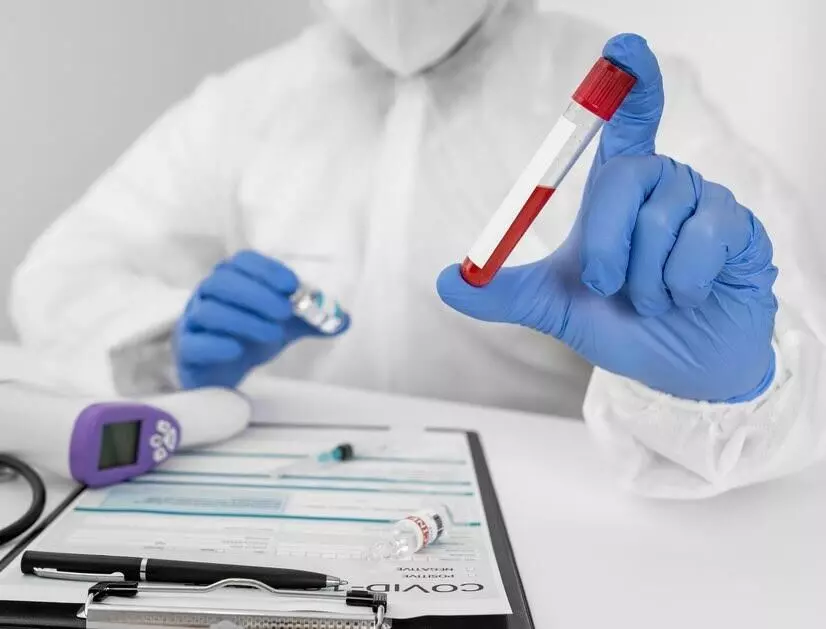Nutritional Deficiencies: Essential Blood Tests for Better Aging

Discover the top blood tests for seniors to detect nutritional deficiencies early. Learn about the importance of a complete blood count test and how to optimise nutrition for healthy ageing.
Ageing adults often face unique nutrition-related challenges, significantly impacting their health and well-being. As the body ages, its nutritional needs evolve, and deficiencies can arise, potentially leading to various health issues. Understanding these needs and addressing them effectively is crucial for healthy ageing. In this blog, we delve into the top 10 blood tests essential for older adults to proactively detect and address nutritional deficiencies. We'll explore the significance of tests like the complete blood count test and common defects prevalent in ageing populations and provide practical steps to optimise nutrition, fostering a path towards vibrant and healthy ageing.
Health Consequences of Nutritional Deficiencies
Weakened Immune System: Proper diet is critical for a strong immune system. Deficiencies in essential nutrients such as vitamins A, C, D, and E and minerals such as zinc and iron can affect immune function, rendering older people more vulnerable to infections and diseases.
Muscular Weakness and Loss of Mobility: Nutritional deficiencies, particularly those involving protein and vitamin D, can lead to muscular weakness and loss of mobility in older persons. This raises the likelihood of falls, fractures, and loss of independence.
Cognitive Decline: Certain nutrients, including omega-3 fatty acids, B vitamins (particularly B12), and antioxidants, are essential for brain health and cognition. Untreated deficiencies in certain nutrients can hasten cognitive decline and raise the risk of neurodegenerative illnesses such as Alzheimer's.
Cardiovascular Issues: Nutrient deficiencies in omega-3 fatty acids, magnesium, potassium, and antioxidants can contribute to cardiovascular disorders such as high blood pressure, arrhythmias, and atherosclerosis. These conditions can raise the risk of heart disease, stroke, and other cardiovascular problems.
Bone Health: Calcium, vitamin D, vitamin K, and magnesium are all needed for bone health and the prevention of osteoporosis. Untreated shortages in these nutrients can result in brittle bones, fractures, and a higher risk of falls.
Anaemia: Iron, vitamin B12, and folate deficiencies can cause a drop in red blood cell or haemoglobin levels. Anaemia can produce weariness, weakness, dizziness, and shortness of breath, limiting an individual's ability to do daily tasks.
Vision Problems: Nutritional deficits in vitamins A, C, and E, as well as certain minerals like zinc, can contribute to eye disorders like macular degeneration and cataracts, resulting in decreased vision or blindness.
Skin Issues: Inadequate consumption of essential nutrients such as vitamins A, C, and E, as well as omega-3 fatty acids, can hurt skin health, causing dryness, premature ageing, and an increased susceptibility to infections.
Addressing and repairing nutritional deficiencies in older persons requires dietary changes, supplements, and medical interventions to preserve optimal health and promote good ageing. Regular blood testing can help detect deficits early and advise appropriate actions.
10 Essential Tests for Nutritional Deficiencies in Senior Citizens
The following essential tests and a complete medical evaluation can help identify and manage nutritional deficiencies in seniors, encouraging healthy ageing and general well-being. Regular monitoring and follow-up are critical for tracking progress and adapting therapies as needed.
1. Vitamin D Test: Determine your vitamin D levels, as deficiency is frequent in older persons and is connected to bone health, immunological function, and overall well-being.
2. Vitamin B12 Test: Determine serum B12 levels, as deficiency can cause anaemia, neurological symptoms, and cognitive deterioration.
3. Folate Test: Determine folate levels, as a deficiency can lead to anaemia and other health problems, especially in elderly persons with poor dietary intake or malabsorption.
4. Iron Test: To rule out iron deficiency anaemia, measure iron levels such as serum iron, ferritin, and total iron-binding capacity (TIBC).
5. Calcium Test: Serum calcium levels are measured to evaluate bone health and calcium metabolism, particularly in elderly persons at risk of osteoporosis.
6. Magnesium Test: Determine serum magnesium levels, as deficiency can lead to muscle weakness, cardiovascular difficulties, and other health issues.
7. Thyroid Function Tests: To measure thyroid function, thyroid-stimulating hormone (TSH) and free thyroxine (T4) can be used, affecting metabolism and food metabolism.
8. Comprehensive Metabolic Panel (CMP): Evaluate electrolyte levels, renal function, and liver function, which can impact nutrition metabolism and general health.
9. Homocysteine Test: Elevated homocysteine levels may indicate vitamin B12, folate, or B6 deficiencies and are linked to cardiovascular risk.
10. Omega-3 Index Test: Determine the quantities of omega-3 fatty acids in red blood cells, as a deficiency can influence cardiovascular health, cognitive function, and inflammation.
Dietary and Lifestyle Recommendations
Essential fats- Regarding food groups, fats are the most commonly ignored. However, it is crucial to understand that not all fats are unhealthy. In reality, it is necessary for the healthy functioning of the brain. Include more polyunsaturated and Omega-3 fatty acids in your diet. Fish and fish oils are the finest sources. Alternatives include avocados, almonds, coconut oil, and so on.
Fibres - Another ignored dietary group is fibres, the indigestible parts of fruits and vegetables made primarily of cellulose. They are incredibly vital for intestinal health. Aside from that, they can lower the risk of Type 2 diabetes and protect the body from insulin spikes after eating sugary foods.
Antioxidants- They are abundant in brightly coloured fruits, berries, and dark green vegetables. Among their many advantages, they protect cells from oxidative damage produced by disease-causing bacteria and inhibit cancer cells.
Include Nutritional Rich foods: Incorporate foods high in crucial nutrients that are commonly deficient in ageing individuals:
● Calcium: Dairy products, leafy greens (such as kale and collard greens), tofu, almonds, and fortified foods.
● Vitamin D: Fatty fish (salmon, mackerel, tuna), fortified dairy and plant-based milk, egg yolks, and sunlight exposure.
● Vitamin B12: Animal products (meat, fish, poultry, dairy), fortified foods (such as cereals and plant-based milk), and supplements if needed.
● Omega-3 fatty acids: Fatty fish (salmon, sardines, trout), flaxseeds, chia seeds, walnuts, and algae-based supplements.
● Iron: Lean meats, poultry, seafood, beans, lentils, fortified cereals, and leafy greens (spinach, kale).
● Magnesium: Nuts, seeds, whole grains, legumes, leafy greens, and bananas.
Complete Blood Count Test
The Complete Blood Count Test(CBC) is essential for monitoring overall health and diagnosing probable nutritional deficiencies in older adults. This test offers valuable information on the blood's numerous components, such as red, white, and platelets. While CBC can not directly evaluate vitamin levels, anomalies in specific blood cell counts may indicate underlying nutritional concerns.
Anaemia: Low red blood cell count (RBC), haemoglobin, or hematocrit levels may indicate iron insufficiency, vitamin B12 deficiency, or folate deficiency anaemia.
Infections or Inflammation: Changes in white blood cell counts (WBC) can suggest an illness or inflammatory disease, which may impair nutrient utilisation or raise nutrient requirements.
Platelet Count: Abnormal platelet counts might occur due to dietary shortages or underlying health issues.
A CBC test is a regular screening technique healthcare providers use to assess general health and identify probable nutritional deficiencies. Additional testing and actions may be indicated to address weaknesses and improve nutritional status depending on the findings and clinical presentation.
Conclusion
Seniors can improve their nutritional status and promote healthy ageing by understanding the potential health consequences of dietary deficiencies and undergoing essential blood tests, such as the Complete Blood Count (CBC) and other recommended screenings. Incorporating nutrient-rich foods into their diet, staying hydrated, engaging in regular physical activity, managing stress, and getting advice from healthcare professionals are all critical steps towards maintaining optimal nutrition and general well-being as people age.
FAQs
What blood tests are most significant for longevity?
Blood tests can determine overall health and lifespan, including a lipid panel, fasting blood glucose, complete blood count, inflammatory indicators (e.g. C-reactive protein), vitamin D and B12 levels, and hormones (e.g. TSH).
What is the blood test for malnutrition in older people?
Albumin, albumin, transferrin, retinol-binding protein, insulin-like growth factor-1, and fibronectin are standard laboratory tests used to assess nutritional status.
What is the relevance of the Complete Blood Count (CBC) test in determining nutritional status?
The CBC test assesses several blood components, including red blood cells, white blood cells, and platelets. While it does not directly evaluate vitamin levels, specific blood cell count anomalies can suggest nutritional deficits in seniors.
How can older people improve their nutrition to avoid and treat nutritional deficiencies?
Seniors can improve their nutrition by eating a well-balanced diet high in nutrient-dense foods, taking supplements as needed, staying hydrated, engaging in regular physical activity, controlling stress, and getting frequent blood tests to monitor nutrient levels and overall health.
Why are blood tests essential for detecting nutritional deficiencies in ageing adults?
Blood tests provide valuable insights into nutrient levels and overall health status, helping identify deficiencies early and guiding appropriate interventions to support healthy ageing.














